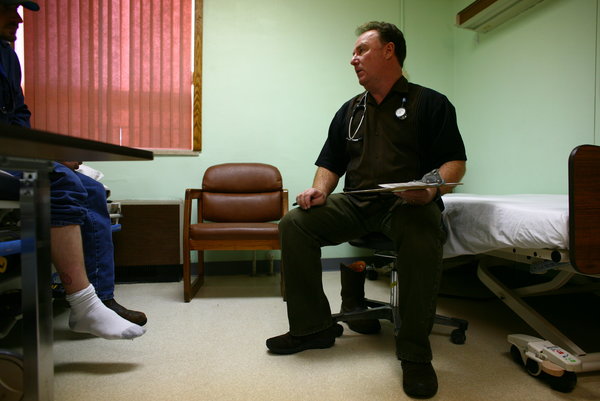I’ve written about this before particularly when the Affordable Health Care Act (aka Obamacare) was in the works, but this is a really good example of why we need it. Yesterday the New York Times had a long story about the hospital crisis in North Dakota. This is the same North Dakota where we are having an oil boom and where there is no unemployment. But there is a health care crisis.
The patients come with burns from hot water, with hands and fingers crushed by steel tongs, with injuries from chains that have whipsawed them off their feet. Ambulances carry mangled, bloodied bodies from accidents on roads packed with trucks and heavy-footed drivers.
The furious pace of oil exploration that has made North Dakota one of the healthiest economies in the country has had the opposite effect on the region’s health care providers. Swamped by uninsured laborers flocking to dangerous jobs, medical facilities in the area are sinking under skyrocketing debt, a flood of gruesome injuries and bloated business costs from the inflated economy.
These are men is mostly unskilled jobs without health insurance.
Hospitals cannot simply refuse to treat people or raise their rates. Expenses at those 12 facilities increased by 15 percent, Mr. Bertsch added, and nine of them experienced operating losses. Costs are rising to hire and retain service staff members, as hospitals compete with fast food restaurants that pay wages of about $20 an hour.
“Plain and simple, those kinds of things are not sustainable,” he said.
Many of the new patients are transient men without health insurance or a permanent address in the area. In one of the biggest drivers of the hospital debt, patients give inaccurate contact information; when the time comes to collect payment, the patients cannot be found. McKenzie County Hospital has invested in new software that will help verify the information patients give on the spot.
To their credit, public officials in North Dakota are trying to do something.
Mr. Kelly has pushed for the state, which has a surplus of more than $1 billion, to allocate money intended for the oil region specifically to health care facilities in the area. He has also asked for the state to grant low-interest loans so hospitals can borrow money for facility improvements and for the governor to convene a task force to study health care issues in the oil patch.
Aides to Gov. Jack Dalrymple say he is taking steps to bolster medical training in the state, proposing to spend $68 million on a new medical school building at the University of North Dakota and $6 million to expand the nursing program at Lake Region State College. Mr. Dalrymple, a Republican, has also increased Medicaid financing for the state’s rural hospitals.

US residents with employer-based private health insurance, with self insurance, with Medicare or Medicaid or military health care and uninsured in Million; U.S. Census bureau: Income, Poverty, and Health Insurance Coverage in the United States: 2007 (Photo credit: Wikipedia)
If we had universal health care, every one of those men would carry a card. If we had computerized records that were actually accessible the doctors would have a medical history. Right now the best we can hope for is that some of them will get employer paid insurance next year as the ACA continues to be implemented. In the meanwhile, the health care system will struggle.
The cramped housing camps where many oil workers live can add to health issues. On a recent afternoon at McKenzie County Hospital, a man limped into the emergency room complaining about a dry, red patch of skin on his leg. Dr. Gary Ramage, the hospital’s sole full-time physician, said it was a bite from a brown recluse spider, which had most likely nested under the trailer where the man lives.
…
But for now, Dr. Ramage, a gregarious Canadian who has worked here for 18 years, is left shouldering much of the load. Before the oil boom started a few years back, Dr. Ramage covered both the clinic and the emergency room. Now he mostly works at the clinic, while the hospital hires roving physicians to cover the emergency room. He is well known in the community, and people call him at home when they are sick. But now, he does not know many of the patients he sees.
“My work is no longer small-town work,” he said. “My work has now been transformed from that of a small family practitioner to basically an E.R. doc.”

Dr. Gary Ramage treating a patient at McKenzie County Hospital in Watford City, N.D. The hospital now averages 400 emergency room visits per month.
Photograph: Matthew Staver for The New York Times
Related articles
- Hospitals And The Oil Boom in North Dakota (nytimes.com)
- Whither Employer-paid Health Insurance? (centerforhealthmediapolicy.com)
- What To Do, What To Do (sporkinthedrawer.typepad.com)
- Opening Up Big Data is the Big Solution to Curing Health Care Ills, according to Kauffman Report (kauffman.org)
- Man dies in North Dakota hydraulic fracturing accident (rapidcityjournal.com)
